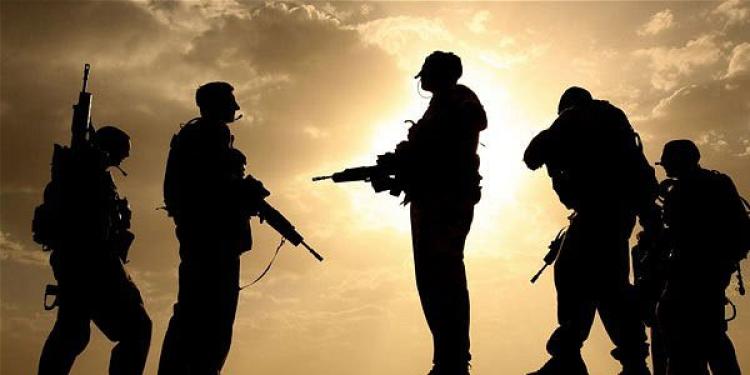Why Cant I Wager On War?
Posted: February 27, 2015
Updated: October 6, 2017

Why do we still allow the media’s bias portrayal of some forms of gambling to impinge upon us as a society and isn’t this just the thin end of a very big wedge?
The hypocrisy that surrounds people’s attitudes to gambling is unfortunately rather pathetic. Those who risk their lives doing bizarre sports and pastimes like mountain climbing or parachuting are simply adventurers, despite all the myriad of dangers upon which they’ve staked their very lives, whilst those of us that risk mere money alone in online casinos in the UK or elsewhere are deemed to be irrevocably tarnished “gamblers”.
The connotations to the latter are, rather unfortunately, entirely negative, whilst the former elicits visions of bold daring do and the overcoming of the limits of human endurance and capability. The popular perception being that the gamblers are always just like a dusty armed cowboy around a saloon poker table ready to shoot anyone he can’t cheat, and the adventurers are all Indiana Jones with whip, hat and a ready supply of drily amusing disposable one-liners.
This perception is fed gleefully by the modern media who tout the adventurers before hand, interviewing them and gushing over their plans to sail around the world blindfold using only their right elbow, follow the progress they make, and then sympathize hugely when the entire adventure comes to a premature ignominious end in glorious failure, encouraging the typically injured fool to try it all again soon. Gamblers make for dull visuals, even when arrested like Patsy Capolongo, so can be easily rubbished, unlikely ever to boost viewer numbers or circulation.
The one time the media do decide to focus on gambling is when someone in their ‘human interest’ department watches “The Sting” at the weekend and decides to do a piece about what they term “Problem Gambling”. Now I will not deny that for some gambling is a harmful addiction, having dramatic and hugely negative, sometimes terminal, effects on their lives and the lives of those around them, but the media do somewhat over-egg the issue.
Not Often Fair And Balanced
The media like to manufacture communal hate figures. They’ve a disparate and divided audience they need to rally behind a single opinion or they run the risk of displeasing huge sections of their customer base, it being far easier to be heavily bias one way than actually produce a balanced report (which requires tiresome things like ‘real journalism’ and ‘integrity’). The presentation of only the negative impacts of gambling by the media is just part and parcel of this.
Gamblers Unfairly Maligned
• Hypocrisy rife in the media
• Portrayals usually misleading
• Are the laws out of step?
Oh there are filler pieces or the odd sidebar article about changes in UK gambling laws in some of the more intellectual corners of the media, but these are brief and fleeting at best, the rest a barrage of negativity. In order to get the audience harmonized this negative coverage tends to center around how much “Problem Gambling”(TM) costs them money in various ways, and underlines it with the subtext implication the victims of gambling addiction are just stupid and their viewers and readers aren’t.

Naturally the fact that “Problem Gambling”(TM) by no means costs as much to the taxpayer as, say, the emergency services having to rescue dangling people from the side of a cliff half way up a mountain, or untangle their parachutes from power lines or diverting an entire ship of the Navy, that really should be defending the our realm from these hoards of terrorists I keep hearing about, merely to search for some capsized idiot, seems not to bother them in the slightest.
Likewise there’s a rather disingenuous imbalance between the vulture-like interviews with the families of problem gamblers, recounting horror stories of missing money, loss of their home, being sold into slavery pretty much the tone. This contrasts with the families of adventurers who are skillfully led to highlight their stoic stiff upper lips and huge pride, rather than the blood chilling fear of having to tell the kids daddy got himself killed doing something pointless that keeps them awake every night.
Do You Want A War [Y/N]
The media’s mealy mouthed attitude unfortunately tends to dictate both the public perception and the laws that are made, thus despite the legal ability of one and all to gamble per se, the taxation and regulations are rarely simple and straight forward. Even less so now the internet sites like Bet365 and it’s ilk allow those that like to bet on sports in the UK to wager upon sports in countries thousands of miles away. The hypocrisy that the media engenders thus even penetrates into gambling itself.
Supposedly there’s a prohibition that prevents the placing of bets on human suffering, but this seems only haphazardly applied. Why, for instance, can I not bet on how many people will be killed in fiery plane crashes over the next 12 months, and yet it’s perfectly alright for me to wager on the winner of the Eurovision song contest? Fiery plane crashes almost certainly causing less suffering to fewer people that the dire dirge demonstration that is the Eurovision song contest.

You can place a bet on the Presidential election which will almost certainly come down to a foot race between Jeb Bush and Hillary Clinton, which, given their stated rhetoric, is tantamount to putting money either behind having a war or not………but you can’t place a bet on who’ll win the war nor how many bodies will be stacked up in the process. You can bet on politics and see governments cause untold suffering with their policies both at home and abroad, but you can’t bet on how much suffering.
With jingoistic faux-patriotism at an all time high, as the media and politicians try to hide the issues at home with the problems “abroad” always seems to cause, perhaps the time is right to just let go of this ridiculous notion we have that we care that much. The morals of the 1950s are long shattered, the injustices and flagrant double standards at risk of choking us, so lets get rid of them. Now is the right time to face up to who and what we are and ask; Why can’t I wager on war?












